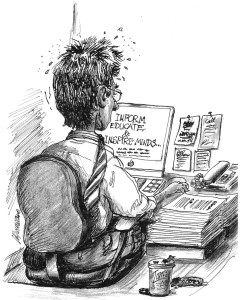|
This page was exported from King Weekly Sentinel
[ https://kingsentinel.com ] Export date: Sat Apr 5 6:21:09 2025 / +0000 GMT |
Saving all the milestones of mankindMark Pavilons Human beings are interesting creatures. Our own brains are like mini super-computers, holding a vast amount of information that we've gathered over our lifetimes. A big part of who we are, and where we came from, are our memories. Our own personal pasts are vital to our makeup, and our unique lineage and family trees. Go back far enough, and we'll find ancestors sitting in those very trees eating bananas! While most of us will agree that our past is crucial, how many are concerned about humankind's beginnings and coloured history? I've always enjoyed studying history and I still devour articles about ancient civilizations and relics from our past. Lately, I've developed an interest in Mayan, Roman, Greek and Egyptian civilizations and I've tried to acquire some artifacts through online sources. I really like the idea of holding a piece of history in my hand and wondering about an item's journey through time. I visited the Mayan ruins at Chichen Itza with my late mother – it was one of the items on my bucket list. I remember that day clearly. As children, we're exposed to museum trips and we likely had our faces pressed up against the glass, staring at mummies or dinosaur bones. Humans simply love a good mystery and what better than examples from our own past? We have many “world wonders” that continue to grab our attention and draw tourists from around the globe. Time has taken its toll on many of these structures. But the worst offender is constant human conflict. The war in Syria has taken its toll on many beautiful creations from our ancient civilizations. The Islamic State (ISIL) regularly commits what's known as cultural property crimes, targetting mainly Muslim architecture and monuments for destruction. They also sell looted antiquities to fund their terrorist efforts. Falling victim to their senseless destruction were the Mosul Museum and ruins in Nineveh, Nimrud and Hatra, which was classified as a UNESCO World Heritage site. This country has lost many monuments, mosques and structures. Without intervention, they will continue to destroy thousands of years of human achievement in Syria and Iraq. This region is known as the “cradle of civilization.” Conflict in other parts of the world are resulting in similar devastation. The Ukraine and its coastal areas are well known for ancient settlements. In Afghanistan, we've lost the Buddahs of Bamiyan. Cyrene, Libya, established in 630 BC, has largely been bulldozed. Some may contend that we should concentrate on human suffering and not worry about old ruins. They're not mutually exclusive. We are all inextricably linked, not only to one another, but to our past. In Canada, we are crusaders in protecting heritage and we defend cultural identity. That's what it's all about. Can you imagine losing the Pyramid of Giza, Stonehenge, the Acropolis of Athens, the Colosseum in Rome or even Westminster Abbey? It's often said that we are the guardians, the stewards, of our species. It's up to all of us to make sure our past remains intact for generations to come. That is our legacy. Technology is helping to preserve humankind's noteworthy achievements. A super memory crystal is being developed that can store data for an estimated million years. It stores digital information in five dimensions and it's made of fused quartz from silica. A laser is used to etch data into the crystal and can hold 360 terabytes of information – equivalent to 500,000 CDs. While this bodes well for certain applications, it can't save physical items from the ravages of man or time. I think we suffer from a certain degree of smugness in our self-importance. I also think many people believe that others are looking after our best interests. Indeed. Yes, many archeologists are risking their lives trying to save artifacts in these dangerous, war-torn regions. There are people in the basements of almost every museum, trying to painstakingly restore trinkets and priceless pieces. There are researchers and scientists working tirelessly, trying to figure out how to reverse the damage we've caused to this planet. Humans have left a noticeable imprint on this planet for only maybe 10,000 years. That's a nano-second in comparison to our cosmic history. Look how far we've come since the time of Christ. We have created some marvellous things during our time here. And we're continuing to build, engineer and produce structures, monuments and cultural pieces that add to our civilization in so many ways. Archeologists, in say, another 2,000 years, may indeed find us fascinating. They would just love our automobiles, shopping malls, amusement parks, and cultural phenomena such as rap music, fad diets and motivational speakers. Would they take an interest in our currency, weapons or fancy amulets? Would our vast array of TV reality shows, political debates and YouTube videos be saved on those data crystals for millennia to come? Maybe our past is much more interesting than our present. In a few billion years, we will no longer exist. Humankind. Worth preserving? You bet! |
| Excerpt: Human beings are interesting creatures. Our own brains are like mini super-computers, holding a vast amount of information that we’ve gathered over our lifetimes. A big part of who we are, and where we came from, are our memories. |
|
Post date: 2016-03-18 12:44:33 Post date GMT: 2016-03-18 16:44:33 Post modified date: 2016-03-18 12:44:33 Post modified date GMT: 2016-03-18 16:44:33 |
| Powered by [ Universal Post Manager ] plugin. HTML saving format developed by gVectors Team www.gVectors.com |